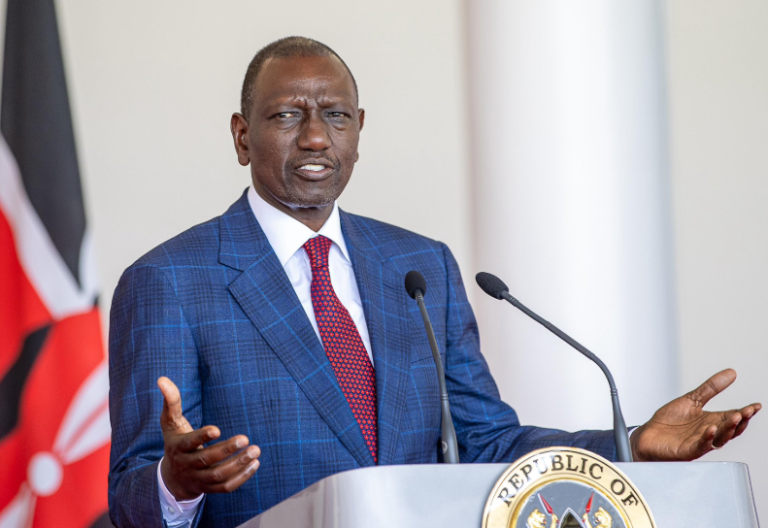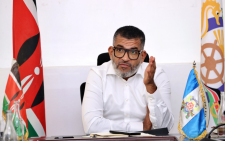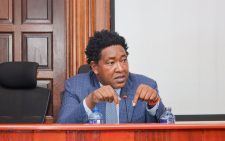Slide to autocracy: Ruto’s harsh stand on demos cause for alarm

President William Ruto’s remarks yesterday in the wake of the Gen Z-led protests wave have triggered widespread condemnation, with critics warning that Kenya could be slipping into authoritarian rule.
Speaking during the commissioning of a police housing project in Nairobi’s Kilimani area on Wednesday, July 9, 2025, the President issued an alarming directive that police should shoot protesters in the leg if caught looting or destroying property.
“Anyone who burns down someone else’s business and property, let them be shot in the leg and go to the hospital as they head to court,” Ruto said. “Yes, let them not kill, but shoot and break the legs. Destroying people’s property is not right.”
‘Inciters’ warned
He warned unnamed politicians he accused of inciting youths to violence: “It is leaders financing youths to carry out those acts, and we are coming after you. Those who attack our police, security installations, including police stations, are declaring war. It is terrorism, and we are going to deal with you firmly. We cannot have a nation run by terror and governed by violence – it will not happen under my watch.”
The President’s remarks ignited an angry backlash across the country, with many Kenyans accusing him of invoking a dangerous, outdated tribal narrative to deflect growing criticism of his leadership amidst concern over the erosion of civil liberties and the growing centralisation of power.
“They have lost the tribal card and started talking about inter-generational dialogue—as if this is an intergenerational conflict. This is Kenyans versus totalitarians. We are going to fight to the last breath,” said James Chege, of Nairobi.
“My biggest worry is that up to this moment, Ruto hasn’t realised that people aren’t attacking him because of his tribe. The attacks are because of his incompetence – misusing taxpayers’ money for personal luxury and that of his inner circle,” posted Demian Phoenix on X.
Slow erosion
Amid rising calls for accountability, many now wonder whether the country is quietly shifting from democracy to dictatorship.
Political scientist Daniel Stockemer of the University of Ottawa recently published a framework in Politics & Policy outlining how democracies gradually slide into authoritarianism – not through coups, but through slow, calculated erosion.
Stockemer said the degeneration follows six steps: societal turmoil, mobilisation through a radical project, elections as the legal turning point, neutralising checks and balances, securing persistence in power, and restricting civil liberties.
It is a model that increasingly mirrors Kenya’s unfolding political landscape.
Stockemer notes that successful autocratic transitions often begin with societal unrest – conditions that currently define Kenya, with youth-led protests, skyrocketing taxes, joblessness, and mounting economic frustration.
Concentrating power
Once elected, such leaders tend to concentrate power.
“In nearly all recent cases of democratic backsliding, the powerful leader has been a charismatic populist who builds their winning coalition around a mass movement,” he writes.
Ruto fits this mould. His 2022 “hustler” campaign tapped into deep public dissatisfaction with the Jubilee administration, rebranding economic marginalisation into a populist battle cry against dynasties.
He styled himself as a voice of the downtrodden – rallying the youth, the jobless, and small traders into a formidable coalition that catapulted him to State House.
But now, critics say, the same leader who preached economic freedom is cracking down on dissent, consolidating power, and demonising his critics.
Peter Lockwood, a researcher from the University of Manchester, argues that Ruto’s campaign was less about empowering hustlers and more about capitalising on anti-Jubilee sentiment, particularly in regions like Kiambu, where locals were disillusioned by former President Uhuru Kenyatta.
Firm hand
Now in power, Ruto has made clear he intends to rule with a firm hand. His inner circle is tightly knit, decision-making is highly centralised, and power is increasingly concentrated in the presidency.
Former Attorney General Justin Muturi, once a loyal ally, described Ruto’s leadership as a “one-man show”, lamenting how Cabinet meetings have become ceremonial as State House unilaterally steers national policy.
The trend has extended to Parliament, where the executive has effectively neutralised opposition through political inducements and shifting alliances. Ruto’s Kenya Kwanza coalition has absorbed rival MPs in droves, creating an artificial majority that undermines checks and balances.
Perhaps more disturbing is the growing number of reported abductions and extrajudicial actions targeting government critics.
Abductions and disappearances
Human rights groups say at least 82 cases of abductions and enforced disappearances have occurred, with 29 individuals still missing.
The Kenya National Commission on Human Rights reports that most victims were vocal dissidents or online activists.
Two of those abducted – Justus Mutumwa and Martin Mwau – were later found dead at Nairobi Funeral Home (formerly City Mortuary).
No clear explanation has been offered. Cartoonist Gideon Kibet Bull and 24-year-old Billy Mwangi were among those reportedly abducted for sharing AI-generated images depicting President Ruto in a coffin.
They were later released without charges.
Despite official denials, many fear the emergence of a clandestine State security apparatus operating outside the law.
‘Killer squad’
Former Deputy President Rigathi Gachagua recently dropped a political bombshell, accusing Ruto of reviving a “killer squad” within the National Intelligence Service (NIS) and disguising them as DCI officers.
Gachagua claimed the NIS procured Subarus for covert operations and linked the squad to recent deadly crackdowns on protesters.
“Stop crying wolf and creating narratives of a planned overthrow,” he said. “Nobody wants to overthrow you. Kenyans relish the chance to humiliate you in 2027. Stop killing and profiling young people. Abolish the 101 killer squad. Stop police brutality.”













